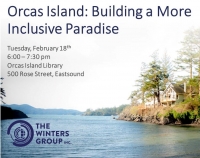ORCAS ISLAND: When Paradise Isn’t, But Could Be

A discussion of what community means, interpersonal awareness, cultural competence, and a confirmation of individual and collective action to foster a diverse and inclusive community on Orcas Island, will take place on Tuesday, February 18th, from 6:00 to 7:15 at the Orcas Island Library at 500 Rose Street in Eastsound.
FOR IMMEDIATE RELEASE / PRURGENT
ORCAS ISLAND: BUILDING A MORE INCLUSIVE PARADISE
When Paradise Isn’t, But Could Be
EASTSOUND, WA—
Orcas Island is this perfect backdrop for creating and living your best life, but for some, there is an undercurrent of intolerance and, in some cases, blatant racism. What will you do to nurture your oasis?
Most of the articles about Orcas Island glow as they entice us with titles like: “Why Washington's Orcas Island Should Be Your Next Family Getaway,” and “This Island in Washington State Will Make You Feel Like a Multimillionaire.” These articles outline the charms and beauty of Orcas Island— “magical scenery, community, and cuisine that make you feel like Oprah.” The New York Times travel editors identified Orcas Island as one of its top 52 places to visit in 2019 “for its impressive tide-to-table culinary scene and experimental wines.”
We take a different perspective. Our concern is the culture of inclusion and care of our full-time community. We reflect on Orcas Island considering its African American, LGBTQ, Latino, Asian/Pacific Islander, Senior, and Bi-Racial people. Orcas Island may be a perfect place, but for some, there is an undercurrent of intolerance and racism. What can be done?
A discussion of what community means, interpersonal awareness, cultural competence, and a confirmation of individual and collective action to foster a diverse and inclusive community on Orcas Island, will take place on Tuesday, February 18th, from 6:00 to 7:15 at the Orcas Island Library at 500 Rose Street in Eastsound. Our purpose is to elevate our community’s values—and its joy—by initiating a conversation about empathy, relationship, and kinship. All residents in Washington State, or who frequent Orcas Island, are encouraged to attend or receive materials from the meeting to spark a discussion in their community.
More than a year ago, Timothy Coffey wrote a guest column in the Orcas Island Sounder condemning bigotry. The column sparked a debate within the paper, and the Orcas Island Facebook Rant & Rave page, about an individual’s right to engage in a private conversation versus the importance of speaking up against bias, stereotypes, and racism. While the two women mentioned in the column were in a private conversation, that private conversation took place within a public restaurant, within the Orcas Island community.
In the fifteen months since Coffey spoke up, other Orcas Island residents have experienced or witnessed acts of racial or ethnic intolerance on the island. This event is our effort to speak out about this and invite a frank, new, essential conversation in our community.
In July, Kevin Carter, an African American resident, was reminded how people of color are still novelties on the island. He also saw how a person's privilege could make them oblivious to their prejudice.
Carter was eating at the Island Skillet one morning, and an older gentleman, who said he lived on the island, said to the waitress, "Where is your accent from?" Carter could not hear her response. The gentlemen continued to say, "It sounds Hispanic. I guess I will not need to call the INS [Immigration and Naturalization Service].” And then the gentleman chuckled as if his remark was a harmless joke. The gentleman’s actions made Carter uncomfortable.
For Alison Dantzler, another African American resident, it was the experience of listening to a small group of men at Enzo's Restaurant in Eastsound, in September, having a very loud conversation about the Black and Hispanic population in America.
One of them said, "I should just move to Iowa or Idaho where there are no black people so that I won't get mugged," while his friend spoke about how to build "the wall effectively."
Is there an Orcas Island community, and if there is, what are our shared values, beliefs, and norms? Do those norms advocate remaining silent, and thus tacitly approving, or speaking up and fostering a welcoming, 'appreciative, and connected’ community? Do we care enough about these issues to take an active role in fostering a mature, caring community?
Join the discussion and continue it in your local community.
Contact: Kevin Carter
Phone: 601-790-1547
Email: orcasislanddei gmail.com
gmail.com
###